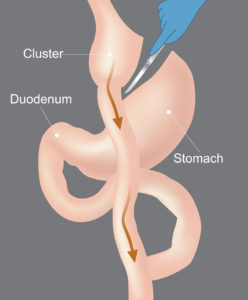 Gastric bypass surgery is a bariatric procedure that brings the most rapid weight loss. It is the most popular of all types of bariatric surgery thanks to how effectively it works.
Gastric bypass surgery is a bariatric procedure that brings the most rapid weight loss. It is the most popular of all types of bariatric surgery thanks to how effectively it works.
Under professional care, all patients who partake this operation receive detailed instructions for managing any risks involved and taking the most out of their new physical changes.
The procedure acts as a kickstart to change your lifestyle for the better, which not only leads to improvements in your health but also in general quality of life and self-esteem.
Find out if this bariatric procedure is right for you by contacting us today.
In basic terms, a gastric bypass surgery divides your stomach and rearranges your gastrointestinal tract so it would significantly reduce your food intake. This means you would feel less hunger and also eat less, leading to a rapid weight loss which you can maintain indefinitely. The weight loss can lead to several improvements with other conditions as well.
The procedure is only meant for people with morbid obesity or obesity alongside comorbid conditions. From all bariatric procedures, the gastric bypass is the most extensive, reducing the size of your stomach by a considerable amount. This means there are certain risks involved and in order for the procedure to have its full effect, a change in lifestyle is required.
Modern bariatric surgery has minimised all risks when it comes to gastric bypasses. While the patient needs a fair amount of time to recover from the procedure, the operation itself is reasonably low risk. The true challenge all patients face is the life after, from recovery to a completely new lifestyle.
However, professionally conducted bariatric procedures no longer mean just the operation. Modern clinics offer full support to people who undertake a gastric bypass operation, from regular check-ins with the surgeon to consultations with bariatric nurses who offer guidance and full nutritional and physical activity plans to take the most out of their new lives.
- Operation time: 1 to 3 hours
- Hospital stay: 3 to 4 days
- Recovery time: 4 to 8 weeks
- Work leave required: at least 2 weeks
After the surgery, you will need to stay at the hospital for up to 4 days to ensure there aren’t any complications and to successfully start off your recovery period. For the first few weeks, a liquid diet is necessary to allow your gastrointestinal system to recover. Expect discomfort and mild to moderate pains for the first few weeks, which can be managed through dietary restrictions and medications.
By far the biggest challenge during recovery period is settling into your new lifestyle. You will feel the need to eat less and will experience fullness faster than before, enabling you to start losing weight. However, you may acquire food intolerances which can upset your stomach and will absorb fewer minerals and vitamins from your food.
These mean a more restricted diet and requiring you to take supplements to keep up your personal well-being. On the other hand, as you start losing weight, your overall health will improve which can bring about a whole new outlook in life.
Gastric bypass is an option for people with morbid obesity or obesity with certain comorbid conditions, such as diabetes, hypertension, arthritis, sleep apnoea, etc. But what exactly does being obese entail?
The BMI system, which is the body mass divided by the square of the body height, classifies normal weight as 18.5 to 25, being overweight as 25 to 30 and obesity as 30+. Gastric bypass operation is only recommended for people who have:
- BMI starting from 30, alongside comorbid conditions.
- BMI starting from 40.
It is best taken as an option to turn around your life when your health is already declining due to your weight and lifestyle. Find out your BMI and do take into account any other conditions you might have that may be connected to your high bodily weight.
Despite the challenges, gastric bypass surgery has saved many lives. Often, the solution to obesity isn’t as easy as making the choice to just start eating better and being more physically active. Common obstacles such as fatigue, clinical depression and anxiety disorders (which can also be comorbid conditions to obesity) can make it very difficult to turn your life around.
Taking the operation route is not an easy choice either, but can be a way to a longer and healthier life.
 Gastric bypass surgery is a bariatric procedure that brings the most rapid weight loss. It is the most popular of all types of bariatric surgery thanks to how effectively it works.
Gastric bypass surgery is a bariatric procedure that brings the most rapid weight loss. It is the most popular of all types of bariatric surgery thanks to how effectively it works.




